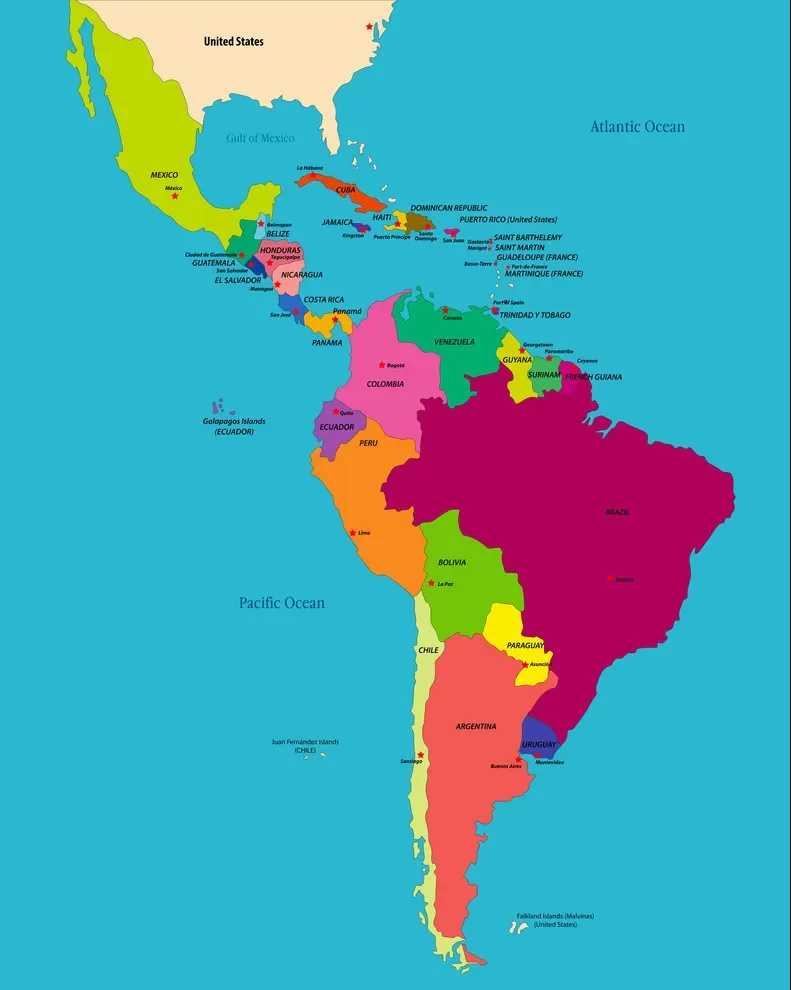- Oct. 12 update: Los Angeles City Councilwoman Resigns Amid Uproar Over Racist Remarks (New York Times)
Struggles of Afro-Latin Americans, Via Newsprint
L.A. Official Steps Down After Leak of Racist Audio
Obama Consults Black Journalists on Disinformation
‘Scoop Machine’ on Walker Is Drawn to the ‘Weird’
Israelis Wound Palestinian Photojournalists
Homepage photo: Political map of Latin America, Vector Image
Updated Oct. 11
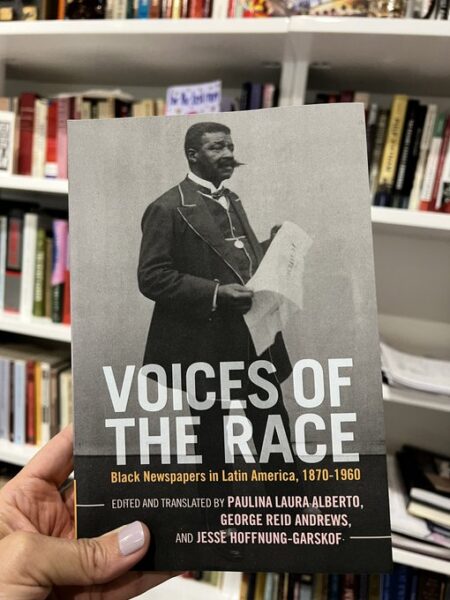
Cover shows Benedicto Ferreyra, in 1908, holding what appears to be an issue of his paper, La Verdad (Buenos Aires) (Credit: Argentine Archivo General de la Nacion)
Struggles of Afro-Latin Americans, Via Newsprint
“In light of North America’s formidable progress, Black North Americans display a racial pride, even judging themselves superior to the Blacks of South America,” Horacio da Cunha, a Black Brazilian journalist, wrote in 1928.
“Perhaps they consider us to be the dregs of society because we lack money.”
The journalist continued, “Would my countrymen like proof? There exist, in this capital city,” Sao Paulo, “many Black North Americans who associate only with their compatriots, keeping to themselves.
“And many of them do not speak Portuguese, because of racial pride, when they should do so in homage to the land that hosts them.
“Meanwhile, we know full well that anyone who wishes to go try his luck in their land has a strict obligation to speak English or American.”
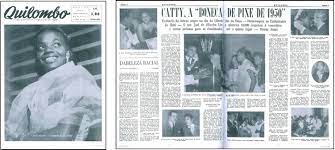 Da Cunha’s comments are just one of the jewels to be found in the newly published “Voices of the Race: Black Newspapers in Latin America, 1870-1960.” (Pictured: Quilombo, from Brazil.)
Da Cunha’s comments are just one of the jewels to be found in the newly published “Voices of the Race: Black Newspapers in Latin America, 1870-1960.” (Pictured: Quilombo, from Brazil.)
But as with newspapers most places, one opinion piece does not speak for all.
The “Voices of the Race” authors write, “Throughout Latin America, writers and intellectuals of all races observed with mixed horror and fascination the workings of racial segregation and anti-Blackness in the United States. Afro-Cubans suffered these barbarities at first hand when they traveled to the United States, making it imperative that they be aware of hotels willing to accept Black guests. . . .
“Diasporic ties were further thickened by personal connections and friendships among African American and Afro-Latin writers and intellectuals. In 1935, Cuban politician and activist Salvador Garcia Aguero published a poem paying homage to African American author Langston Hughes.”
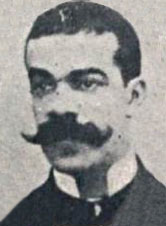 Another Brazilian journalist, Evaristo De Moraes (pictured), was horrified in 1924 by some elite White Brazilians’ explicitly racist reactions to reports that companies in the United States were making plans to buy large tracts of land in central Brazil, to be distributed among African American immigrant settlers.
Another Brazilian journalist, Evaristo De Moraes (pictured), was horrified in 1924 by some elite White Brazilians’ explicitly racist reactions to reports that companies in the United States were making plans to buy large tracts of land in central Brazil, to be distributed among African American immigrant settlers.
“Voices of the Race” illustrates the unequalled role that newspapers play in documenting the first draft of history. But in this case, the benefits go beyond that: “Our major goal in writing the book was to introduce US audiences to the rich history of the Black press in Latin America, and to some of the work produced by its writers and editors. We find that very few people in this country are aware that there is a longstanding tradition of Black journalism in Latin America,” George Reid Andrews of the University of Pittsburgh, one of the authors, messaged Journal-isms Sunday.
While none of the three co-authors is Afro-Latin American, all have specialized in the topic. Paulina Laura Alberto, now at Harvard University, is from Argentina.
Added Jesse Hoffnung-Garskof, husband of Paulina Alberto and also now of Harvard, “Our thinking was to give Black journalists and other readers the opportunity to make up their own minds about how to understand and make use of the material. So I guess our big takeaway is ‘Latin America has and has had a vibrant Black press and this Black press is one of the best, if not the best, places to learn about the history of Afro-Latin American thought, politics, and anti-racist organizing.’ ”
Afro-Latinos are making headway into our consciousness. In June, environmental activist Francia Marquez was elected vice president of Colombia, the first Black person in that role. Last year, the National Association of Hispanic Journalists created an Afro-Latino Task Force, which staged a panel, “Two Worlds — Afro-Latinx in the Newsroom,” at the joint convention this summer of NAHJ and the National Association of Black Journalists.
Nearly 6 million adults in the United States — 12 percent of the U.S. Latino population — identify as Afro-Latino, according to a 2022 study by the Pew Research Center.
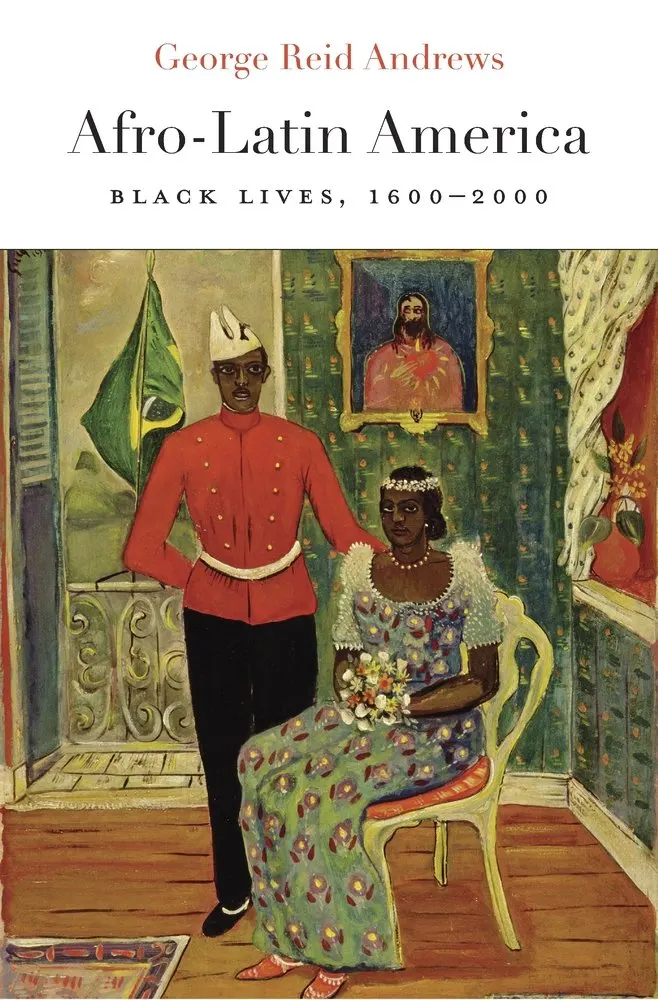 The book covers four Latin American countries: Argentina, Brazil, Cuba and Uruguay, from 1870 to 1960. Of the 20 Portuguese and Spanish-speaking countries in Latin American, these were the four that developed a sustained Black press. (Pictured: “Voices of the Race” co-author George Reid Andrews’ “Afro-Latin America,” published in 2016.)
The book covers four Latin American countries: Argentina, Brazil, Cuba and Uruguay, from 1870 to 1960. Of the 20 Portuguese and Spanish-speaking countries in Latin American, these were the four that developed a sustained Black press. (Pictured: “Voices of the Race” co-author George Reid Andrews’ “Afro-Latin America,” published in 2016.)
“In all four, most Black newspapers and magazines were published in cities with White majorities — cities like Sao Paulo, Montevideo, Havana, and Buenos Aires. Although governments across Latin America launched projects to Whiten local populations and cultures through European immigrants, they achieved greater success in these four cities. For Black writers and readers, the role of race in shaping opportunity and inclusion in these cities was sharply evident and racial identities were highly salient.”
It is not as well-known as it should be that “slave traders brought more African captives to Brazil than to any other New World society,” including the United States. The first Afro-Latin American newspapers appeared in the Empire of Brazil in the 1830s, about the same time that Freedom’s Journal, published in New York on March 16, 1827, became the first African American newspaper.
North American readers will detect some of the same issues in Latin America that were debated in the United States: How “Black” and anti-racist should they be, lest they be accused of being “reverse racists,” and how to avoid falling victim to white notions that they were inferior. An Afro-Uruguayan newspaper in 1872 called Europe “the mother of civilization.”
The authors explain, “The first generation of Afro-Latin American journalists had grown up with African parents and grandparents, and were often sympathetic to their social and cultural practices.
“By the turn of the century, however, doctrines of scientific racism, with their visions of Africans and their descendants as the bearers of genetic and cultural inferiority, led to much more negative views of Latin America’s African heritage, even within the Black press.”
The journalists struggled with the same challenges as publishers everywhere. Their publications could exist only in areas with literate populations. And “while a number of African American papers in the United States became successful business enterprises, virtually all of the Afro-Latin American newspapers lost money; indeed, fundraising campaigns and appeals to subscribers to please pay their overdue bills were regular features in the papers.”
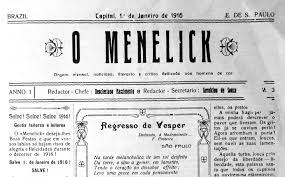 By the early 20th century, in Cuba, “some of the most prominent Black journalists — Martin Morua Delgado, Juan Gualberto Gomez, Rafael Serra, Lino D’ou — held elective office, were appointed to government jobs, or had important positions within party structures. Journalism did not itself necessarily produce enough income to support these men. But Black journalism was embedded in the broader field of politics and patronage in ways that did support a lucky few.” (Pictured: An edition of O Menelick from Sao Paulo, Brazil, which featured an inset poem, “Regresso de Yesper,” on its front page.)
By the early 20th century, in Cuba, “some of the most prominent Black journalists — Martin Morua Delgado, Juan Gualberto Gomez, Rafael Serra, Lino D’ou — held elective office, were appointed to government jobs, or had important positions within party structures. Journalism did not itself necessarily produce enough income to support these men. But Black journalism was embedded in the broader field of politics and patronage in ways that did support a lucky few.” (Pictured: An edition of O Menelick from Sao Paulo, Brazil, which featured an inset poem, “Regresso de Yesper,” on its front page.)
The chapters also cover the role the newspapers played in covering families, the role of women in society and in the newspapers, and social lives. “Writers in the Black press mostly directed their words toward a Black readership. But they were keenly aware of how the wider society judged Black people based on their social events and activities.”
For the authors, there were additional dividends. “Our absolute dependence on the goodwill of friends, colleagues, acquaintances, and strangers became especially clear as the original project to select, translate and annotate these articles from Latin America’s Black press generated a parallel project to identify and locate the descendants of many of these authors in the search for permissions,” they write.
“Even as the scope of that second project expanded to daunting dimensions (exacerbated by the difficulties of travel and communications in a global pandemic), it afforded us the opportunity to be in touch with many of the descendants of these writers and with scholars and activists. These individuals not only mobilized to lend a hand at an immensely difficult time for their families and societies, their responses stirred our hope that this book would help further the anti-racist struggles joined by Afro-Latin American authors in decades and centuries past.”
They announced, “All royalties from Voices of the Race will go toward supporting Afrodescendent organizations in those four countries.”
The book’s editor, Cecelia Cancellaro, is already thinking of another audience. She tweeted on Aug. 29, “Hot off the presses! An extraordinary collection of material from the Black press in Latin America. Collected and organized brilliantly by three incredible scholars (very student friendly). I hope to see courses designed around this volume.”
- Nicole Acevedo, Edwin Flores and Suzanne Gamboa, NBC News: Who’s Latino? Amid growing numbers the definition is expanding (Sept. 15)
- David J. Hellwig, Luso-Brazilian Review: A New Frontier in a Racial Paradise: Robert S. Abbott’s Brazilian Dream (1998)
The Los Angeles Times posted a video version of the story. (Credit: Los Angeles Times/YouTube)
L.A. Official Steps Down After Leak of Racist Audio
The first Latino president of the Los Angeles City Council resigned from the post Monday after a leaked recording, posted on Reddit and then more widely circulated by the Los Angeles Times, showed her making racist comments and other coarse remarks in a conversation with other Latino leaders.
“Council President Nury Martinez issued an apology and expressed shame,” John Antczak reported for the Associated Press.
“In the end, it is not my apologies that matter most; it will be the actions I take from this day forward. I hope that you will give me the opportunity to make amends,” she said in a statement. “Therefore, effective immediately I am resigning as President of the Los Angeles City Council.”
Martinez did not say she would resign her council seat, but the Times editorial board and others said she should, and other Council members in the conversation should join her.
“There is no way she can fairly represent her constituents after leaked audio captured her deplorable and racially divisive comments, her political machinations to maintain power at the expense of communities, and her use of racist, homophobic tropes to describe her colleague, and worse, his young son. She should leave elected office immediately,” the Times editorialized Monday.
The editorial also said, “The casual racism and disregard for colleagues and constituents on the audio revealed a serious rot that cannot be papered over with apologies.
“The audio was from a roughly hourlong conversation from October 2021 with Martinez, Councilmembers Gil Cedillo and Kevin de León and Los Angeles County Federation of Labor President Ron Herrera.
“Cedillo and De León should resign as well. While Martinez was the ringleader in the conversation, firing off insults and attacks, Cedillo and De León joined in with their own commentary. No city with the racial and ethnic diversity of Los Angeles, and a history of interracial conflict, can tolerate leaders who harbor racist, hate-filled views. . . .”
Herrera has resigned from his labor federation post, according to sources, the Times reported.
In the recorded conversation, Martinez said that white Councilmember Mike Bonin handled his young Black son as if he were an “accessory” and described the son as behaving “Parece changuito,” or “like a monkey,” the Times reported Sunday.
“Audio of the wide-ranging, roughly hourlong conversation was posted on Reddit by a now-suspended user. It is unclear who recorded the audio, who uploaded it to Reddit and whether anyone else was present.”
The news organization also said Sunday, “Julie Gutman Dickinson, a lawyer representing the L.A. County Federation of Labor, sent a letter saying the conversation was ‘recorded in violation of California’s privacy and recording laws on LA County Federation of Labor property.’ If The Times published information from it, ‘it is condoning this illegal conduct,’ she added.
“Times General Counsel Jeffrey Glasser responded to Gutman Dickinson in a letter Sunday morning, defending the newspaper’s right to publish the material.
“Audio of the wide-ranging, roughly hourlong conversation was posted on Reddit by a now-suspended user. It is unclear who recorded the audio, who uploaded it to Reddit and whether anyone else was present.
“ ‘It is a fundamental principle in the United States that we do not prohibit or punish the receipt and publication of newsworthy information,’ Glasser wrote.
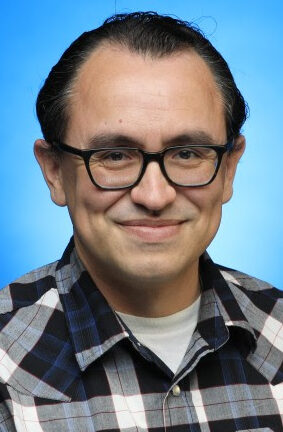 Times columnist Gustavo Arellano (pictured) joined in the call for Martinez’s resignation. “When you have an elected Latina official use words to describe Black people — children, no less — as changuitos (‘little monkeys’) and negritos (‘darkies’) while no one else in the room pushes back, it shows the rot, pettiness and paranoia that infests L.A.’s Latino political class.
Times columnist Gustavo Arellano (pictured) joined in the call for Martinez’s resignation. “When you have an elected Latina official use words to describe Black people — children, no less — as changuitos (‘little monkeys’) and negritos (‘darkies’) while no one else in the room pushes back, it shows the rot, pettiness and paranoia that infests L.A.’s Latino political class.
“The four waded in grievance politics straight out of Sam Yorty’s City Hall,” referring to the three-term mayor from 1961 to 1973 who has been described as race-baiting and a symbol of “rigidity and repression.”
Erika D. Smith, an African American columnist, wrote for the Times Sunday, “In a city where Black people make up a shrinking percentage of the population but still have among the highest rates of poverty and homelessness, what Martinez and De León said — echoed by Cedillo and Herrera — does a lot of damage.
“Their words, now bouncing around social media in snippets of audio, bluntly confirm the worst fears of many Black Angelenos: That Latino politicians treat political power as a zero-sum game. That because of their numbers, they will take over the leadership of the city, and that because of their racist beliefs, they will ignore our needs.”
- Michael R. Blood, Associated Press: Outrage erupts at LA Council meeting over racist remarks
- Los Angeles Sentinel: Statement From Danny Bakewell Sr. Regarding Leaked Audio of L.A. City Council President and Members
Barack Obama told a Stanford audience that racism, sexism, and misogyny all predate the internet, but technology has helped amplify them. (Credit: YouTube)
Obama Consults Black Journalists on Disinformation
Former President Barack Obama gathered several Black journalists to his Washington office “to talk about the ways in which disinformation works its way into Black communities, and what could possibly be done to combat that,” Edward-Isaac Dovere reported Monday for CNN.
Included were “The New York Times Magazine’s Nikole Hannah-Jones, Los Angeles Times executive editor Kevin Merida, Pulitzer Prize-winning journalist Wes Lowery, Columbia University School of Journalism dean and New Yorker writer Jelani Cobb and Washington Post global opinion editor Karen Attiah,” Dovere wrote.
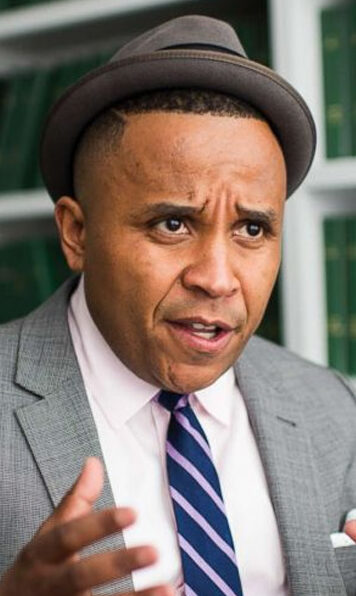 Rashad Robinson (pictured), the president of the advocacy group Color of Change, who also attended the meeting, messaged Journal-isms Monday, “In general it was a conversation about information disorder, the impacts on Black communities and [the] ways in which President Obama might be able to lend his platform and reach to help move us forward.
Rashad Robinson (pictured), the president of the advocacy group Color of Change, who also attended the meeting, messaged Journal-isms Monday, “In general it was a conversation about information disorder, the impacts on Black communities and [the] ways in which President Obama might be able to lend his platform and reach to help move us forward.
“The president asked questions, folks brought their ideas and thoughts. I spent some time earlier this year and last year talking with the President and his team (in person, on the phone and via zoom) about these issues in the lead up to the speech he gave at Stanford (I actually spoke on a panel before his keynote).
“One thing that I’ve been clear about is that we need more energy and hope behind solving this problem which will include accountability on big tech. Of course President Obama has an incredible platform, a deep understanding of the issue and personal experience given all of the disinfo focused at him… so his investment and attention on this issues is huge.”
At an April 21 speech at Stanford University, Obama attempted to rally elites and intellectuals into getting involved with what he described as essentially unregulated social media companies, saying that ‘For more and more of us, search and social media platforms aren’t just our window into the internet. … No one tells us that the window is blurred, subject to unseen distortions and subtle manipulations.”
Facts are competing with opinions, conspiracy theories and fiction, Obama said, Melissa De Witte, Taylor Kubota and Ker Than reported for the Stanford News. “For more and more of us, search and social media platforms aren’t just our window into the internet. They serve as our primary source of news and information. No one tells us that the window is blurred, subject to unseen distortions, and subtle manipulations.”
“The splintering of news sources has also made all of us more prone to what psychologists call ‘confirmation bias,’ Obama said. “Inside our personal information bubbles, our assumptions, our blind spots, our prejudices aren’t challenged, they are reinforced and naturally, we’re more likely to react negatively to those consuming different facts and opinions – all of which deepens existing racial and religious and cultural divides.
“But the problem is not just that our brains can’t keep up with the growing amount of information online, Obama argued. ‘They’re also the result of very specific choices made by the companies that have come to dominate the internet generally, and social media platforms in particular.’
“The former president also made clear that he did not think technology was to blame for many of our social ills. Racism, sexism, and misogyny, all predate the internet, but technology has helped amplify them.
“ ‘Solving the disinformation problem won’t cure all that ails our democracies or tears at the fabric of our world, but it can help tamp down divisions and let us rebuild the trust and solidarity needed to make our democracy stronger,’ Obama said.”
- Reecie Colbert, the Grio: Racist disinformation COVID-19 vaccine campaigns are endangering the Black Community (Aug. 12, 2021)
- Amy Yee, Yes!, How to Combat Disinformation Targeting Black Communities (Nov. 3, 2020)

The Wall Street Journal wrote over a Peggy Noonan column, “The accusation that stings isn’t about abortion or even hypocrisy. It’s that he abandoned his children.” (Credit: CNBC)
‘Scoop Machine’ on Walker Is Drawn to the ‘Weird’
“Roger Sollenberger got his first scoop about Herschel Walker by accident,” Charlotte Klein wrote Thursday for Vanity Fair.
“ ‘Just googling, really,’ the Daily Beast reporter told me. It was June and he was searching for his next story. ‘I didn’t know that I was looking for a kid. I was just following some other track,’ he said, when he stumbled upon some ‘dusty old sites’ that would lead him to his sources (and eventually, the discovery of a son Walker hadn’t publicly acknowledged).
” ‘I don’t know exactly if you could reverse engineer that,’ said Sollenberger. ‘It’s just curiosity.’
And Walker, in Sollenberger’s opinion, ‘is one of the most fascinating figures in American public life in the 40 years that I’ve been alive. . . .’
 Klein also wrote, “Sollenberger (pictured) has emerged this midterms election cycle as an unlikely scoop-machine, breaking big news on Walker’s closely watched race against Democrat Raphael Warnock, a contest that could tip the Senate.
Klein also wrote, “Sollenberger (pictured) has emerged this midterms election cycle as an unlikely scoop-machine, breaking big news on Walker’s closely watched race against Democrat Raphael Warnock, a contest that could tip the Senate.
“A musician and former college English teacher, Sollenberger got an MFA in fiction — ‘the stupid joke would be that prepares me very well for writing the news,’ he notes — and describes his path to journalism with a similar fortuitousness as he did the first Walker scoop. ‘I just sort of fell into reporting, honestly,’ he told me, adding he’s ‘always had a thing for politics’ and ‘government service has been very big in my family.’ He set out to become an investigative reporter a couple years ago and was doing it independently until Salon hired him in April 2020. He joined the Daily Beast as a political reporter about a year later. . . .
“I asked Sollenberger what it’s been like covering this unfolding political drama. ‘When you get a character like this, that is where my narrative background comes in, right?’ he told me. ‘I see these stories and I see the people in them, and I’m drawn to things that are weird and contradictory. And Herschel Walker is one of the weirdest, most contradictory people I’ve ever come across.’ Our call ended abruptly a few minutes later, when Sollenberger said he was getting a big tip and had to go. . . .”
“A brief rundown of Sollenberger’s stories about Walker: The first big one, in June, revealed that Walker had a secret son who had ‘apparently been estranged from his biological father since his birth a decade ago,’ information that the Daily Beast said it confirmed through public posts, a court document naming Walker as the child’s father, and a source close to the boy’s family. (Walker’s campaign claimed Walker was not ‘hiding’ the 10-year-old boy and is ‘proud of his children,’ though the Daily Beast noted that Walker had at that point only publicly acknowledged the existence of one son, 22-year-old Christian Walker.)
“The development seemed to fly in the face of Walker’s public comments about fatherhood and rebukes of absentee fathers in the Black community. A few days later, Sollenberger reported Walker had two other undisclosed children — a 13-year-old he’d fathered with a different woman, and an adult daughter whom he fathered in college. Walker confirmed that he had ‘three sons and a daughter’ in a statement to the Daily Beast, in which he dismissed the notion he was hiding his children. ‘I just chose not to use them as props to win a political campaign,’ he said.
“In July, Sollenberger reported Walker had repeatedly lied to his own campaign about his children, though he’d listed them on a form he filled out in 2018 to be appointed to then president Donald Trump’s Council on Sports, Fitness, and Nutrition — a form the campaign supplied to the Daily Beast. . . .”
Israelis Wound Palestinian Photojournalists
“Photojournalists Louay Samhan and Mahmoud Fawzy were reporting on a raid in the village of Deir al-Hatab, near the city of Nablus, when IDF opened fire and injured the two reporters,” Arab News reported Thursday, updated Friday.
“A 21-year-old Palestinian man, Alaa Zaghal, was killed, and four other people injured in the incident.
“The Committee to Protect Journalists said: ‘Israeli authorities must conduct a thorough and transparent investigation into the shooting of two Palestinian journalists, and take all necessary precautions to ensure that the Israel Defense Force does not shoot at journalists doing their work.’
“According to sources, Samhan and Fawzy, who were working for the Palestinian Authority-funded Palestine TV, were wearing helmets and blue vests that read ‘Press’ on the front and back when they were shot on Wednesday. . . .”
Hadas Gold reported for CNN: “Video from the scene where the two journalists were shot show the two men and their colleagues in a building wearing protective helmets and vests with PRESS labels.
“One of the journalists appears to be climbing in from a window or opening with an injury to the leg before being assisted by colleagues. Another journalist lays across stairs with what appears to be an injury to his arm before he is also assisted up by colleagues out of the house and into an ambulance. The Palestinian Red Crescent said both are in stable condition.
“In a statement, the IDF said they were in the village ‘to apprehend a terrorist suspected of involvement in carrying out the shooting attack at an Israeli bus and taxi adjacent to the city of Nablus last Sunday.’
“The IDF said the suspect, identified by the IDF as an operative working for the Hamas militant group, barricaded himself in a residential building and shot at soldiers, who responded with ‘live fire toward the residence’ as well as ‘fragmentation grenades and a bulldozer.’ The suspect, identified as Salman Amran, was ultimately arrested, the IDF said. . . .”
To subscribe at no cost, please send an email to journal-isms+subscribe@groups.io and say who you are.
Facebook users: “Like” “Richard Prince’s Journal-isms” on Facebook.
Follow Richard Prince on Twitter @princeeditor
Richard Prince’s Journal-isms originates from Washington. It began in print before most of us knew what the internet was, and it would like to be referred to as a “column.” Any views expressed in the column are those of the person or organization quoted and not those of any other entity. Send tips, comments and concerns to Richard Prince at journal-isms+owner@
View previous columns (after Feb. 13, 2016).
View previous columns (before Feb. 13, 2016)
- Diversity’s Greatest Hits, 2018 (Jan. 4, 2019)
- Book Notes: Is Taking a Knee Really All That? (Dec. 20, 2018)
- Book Notes: Challenging ’45’ and Proudly Telling the Story (Dec. 18, 2018)
- Book Notes: Get Down With the Legends! (Dec. 11, 2018)
- Journalist Richard Prince w/Joe Madison (Sirius XM, April 18, 2018) (podcast)
- Richard Prince (journalist) (Wikipedia entry)
- February 2018 Podcast: Richard “Dick” Prince on the need for newsroom diversity (Gabriel Greschler, Student Press Law Center, Feb. 26, 2018)
- Diversity’s Greatest Hits, 2017 — Where Will They Take Us in the Year Ahead?
- Book Notes: Best Sellers, Uncovered Treasures, Overlooked History (Dec. 19, 2017)
- An advocate for diversity in the media is still pressing for representation, (Courtland Milloy, Washington Post, Nov. 28, 2017)
- Morgan Global Journalism Review: Journal-isms Journeys On (Aug. 31, 2017)
- Diversity’s Greatest Hits, 2016
- Book Notes: 16 Writers Dish About ‘Chelle,’ the First Lady
- Book Notes: From Coretta to Barack, and in Search of the Godfather
- Journal-isms’ Richard Prince Wants Your Ideas (FishbowlDC, Feb. 26, 2016)
- “JOURNAL-ISMS” IS LATEST TO BEAR BRUNT OF INDUSTRY’S ECONOMIC WOES (Feb. 19, 2016)
- Richard Prince with Charlayne Hunter-Gault, “PBS NewsHour,” “What stagnant diversity means for America’s newsrooms” (Dec. 15, 2015)
- Book Notes: Journalists Follow Their Passions
- Book Notes: Journalists Who Rocked Their World
- Book Notes: Hands Up! Read This!
- Book Notes: New Cosby Bio Looks Like a Best-Seller
- Journo-diversity advocate turns attention to Ezra Klein project (Erik Wemple, Washington Post, March 5, 2014)
When you shop @AmazonSmile, Amazon will make a donation to Journal-Isms Inc. https://t.co/OFkE3Gu0eK
— Richard Prince (@princeeditor) March 16, 2018

